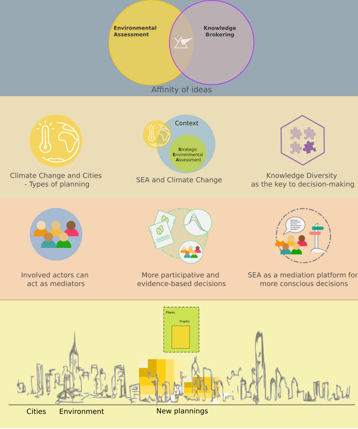Le 14 avr. 2022
Séminaire
Le rôle de l'évaluation environnementale et de la médiation des connaissances dans la gouvernance climatique, par Tiago Rodrigues
Publié le 14 mars 2022 – Mis à jour le 13 avril 2022

Complément date
13h-14h
Lieu(x)
MSH - 4 rue Ledru à Clermont-Ferrand
MSH -Geolab
Lundi 14 mars 2022, 13h-16h
MSH, Geolab
MSH, Geolab
Tiago Rodrigues, Docteur en sciences de l'ingénierie environnementale de l'école d'ingénierie São Carlos de l'université de São Paulo (USP), présentera ses perspectives de recherche sur « le rôle de l'évaluation environnementale et de la médiation des connaissances dans la gouvernance climatique ».
The Climate Governance, the Knowledge Brokering phenomenon, and the role of Environmental Assessment: a constellation-based analysis of the Berlin city case.
The Strategic Environmental Assessment (SEA) is an environmental planning instrument from the Impact Assessment analytical field; which applied to the development of policies, plans, and programs. By promoting the knowledge brokerage between the actors involved, this instrument promotes the environmental dimension in the decision-making process. The specialized literature and political actions have been showing a greater consensus on the fact that climate change takes effect on the cities, and that are the spaces that most contribute to the worsening of this situation. Thus, in reaction, interactions between spatial planning, climate change, and environmental assessment are taking place. The city of Berlin, Germany, for example, has succeeded in implementing its climate adaptation measures in its spatial planning by developing its local land use plans through the integrated support of SEA. Therefore, it is relevant to identify the contextual factors that strengthen the mechanisms of knowledge brokerage and produce such an effect in the Berlin case.
In this seminar, Dr. Tiago Rodrigues will present part of the results of his doctoral thesis, which includes the identification of interdisciplinary boundaries of Berlin's climate governance framework and its relations with the decision-making process of local plans.
This analysis (based on the method of constellation analysis) allowed us to observe how this practice leads to the establishment of governance regimes that act as bottom-up (represented by the environmental associations) and top-down (promoted by district planners) forces; that when they complement each other, could support the consideration of climate adaptation values. The results also show what contextual aspects are responsible for this process and the role of SEA and the knowledge brokering phenomenon.
The Climate Governance, the Knowledge Brokering phenomenon, and the role of Environmental Assessment: a constellation-based analysis of the Berlin city case.
The Strategic Environmental Assessment (SEA) is an environmental planning instrument from the Impact Assessment analytical field; which applied to the development of policies, plans, and programs. By promoting the knowledge brokerage between the actors involved, this instrument promotes the environmental dimension in the decision-making process. The specialized literature and political actions have been showing a greater consensus on the fact that climate change takes effect on the cities, and that are the spaces that most contribute to the worsening of this situation. Thus, in reaction, interactions between spatial planning, climate change, and environmental assessment are taking place. The city of Berlin, Germany, for example, has succeeded in implementing its climate adaptation measures in its spatial planning by developing its local land use plans through the integrated support of SEA. Therefore, it is relevant to identify the contextual factors that strengthen the mechanisms of knowledge brokerage and produce such an effect in the Berlin case.
In this seminar, Dr. Tiago Rodrigues will present part of the results of his doctoral thesis, which includes the identification of interdisciplinary boundaries of Berlin's climate governance framework and its relations with the decision-making process of local plans.
This analysis (based on the method of constellation analysis) allowed us to observe how this practice leads to the establishment of governance regimes that act as bottom-up (represented by the environmental associations) and top-down (promoted by district planners) forces; that when they complement each other, could support the consideration of climate adaptation values. The results also show what contextual aspects are responsible for this process and the role of SEA and the knowledge brokering phenomenon.
